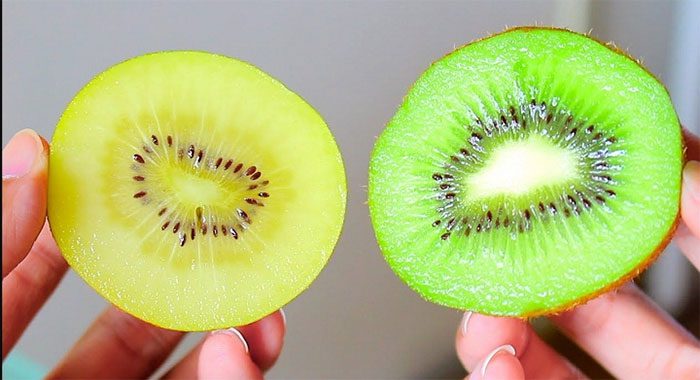You might be surprised to learn that kiwi skin is edible and actually quite beneficial. That light brown skin is packed with nutrients.
Benefits of Eating Kiwi
How do you typically eat a kiwi? Do you peel it and eat the flesh inside, or do you scoop out the flesh with a spoon, using the thin brown skin as a little cup?
But did you know that every part of the kiwi fruit is edible? In fact, you can eat kiwi with the skin just like you would eat an apple. It’s really good for you.
Why Should You Eat Kiwi Skin?

Kiwi skin is also very nutritious. (Photo: C.K).
The kiwi fruit itself has numerous health benefits, which is why it’s dubbed a superfruit, and the skin only adds to those benefits.
According to nutrition expert Gillian Culbertson from the Cleveland Clinic, there are about 60 types of kiwi fruit, and all of them have edible skin. The most popular are green and gold kiwis.
High in Fiber
According to Culbertson, kiwi is already a rich source of fiber, but if you eat the skin, you’ll get even more fiber.
Eating a kiwi with the skin increases your fiber intake by up to 50% compared to eating it peeled. A green kiwi with the skin contains 3.5 grams of fiber, while a golden kiwi with the skin has about 3 grams of fiber.
Rich in Antioxidants
Kiwi skin is loaded with antioxidants. It has three times the antioxidant content compared to the fruit itself. Antioxidants help your body combat free radicals, which can lead to cell damage and contribute to signs of aging and disease.
The antioxidants found in kiwi skin include:
- Vitamin E: Eating a whole golden kiwi increases your vitamin E intake by 32%. Culbertson explains, “Vitamin E also boosts your immune system and helps your body fight off infection issues.”
- Vitamin C: This is another immune-boosting nutrient, and the amount of vitamin C you get from kiwi skin varies depending on the type of kiwi you are eating. One study found that golden kiwis contain more vitamin C (161 milligrams) compared to green kiwis, which range from 85 milligrams to 150 milligrams of vitamin C. Regardless, eating kiwi skin will boost your vitamin C intake.
- Polyphenols: These powerful antioxidants help combat inflammation in your body. Kiwis in general are a rich source of polyphenols, with 30% coming from the skin.
Good Source of Folate
The skin of golden kiwi increases your folate intake by 34%. Folate, also known as vitamin B9, helps your body convert carbohydrates into fuel (glucose) for energy production.
Culbertson states: “It’s crucial for your liver, skin, hair, and eyes, while also helping to keep your nervous system functioning properly. This nutrient is particularly important for pregnant women, as a folate deficiency can lead to complications such as birth defects and anemia.”

If you have a history of kidney stones, avoid kiwi skin.
Who Should Avoid Kiwi Skin?
If you have a history of kidney stones, you should avoid kiwi skin. Culbertson explains, “They contain high levels of oxalate, which can increase the risk of developing kidney stones in individuals with a history of this condition.”
Oxalate is a naturally occurring compound found in some plant-based foods, including spinach, nuts, and kiwis. They don’t serve much function in the body and are excreted through urine, but some people are more sensitive to oxalates.
Culbertson explains: “They can bind with calcium in your body, potentially forming oxalate crystals in your kidneys and joints. This can lead to kidney stones or gout.”
The American Urological Association recommends that those prone to kidney stones should avoid foods high in oxalate.
The skin of golden kiwi does not have the coarse fuzz like that of green kiwi. Therefore, you can easily eat the whole skin. Alternatively, when washing the kiwi, you can use a cloth or brush to gently scrub the skin to remove this fuzz. Or you can slice it and eat it or make a smoothie with the whole kiwi.
And no matter how you choose to eat kiwi, your body will thank you for consuming the skin.



















































